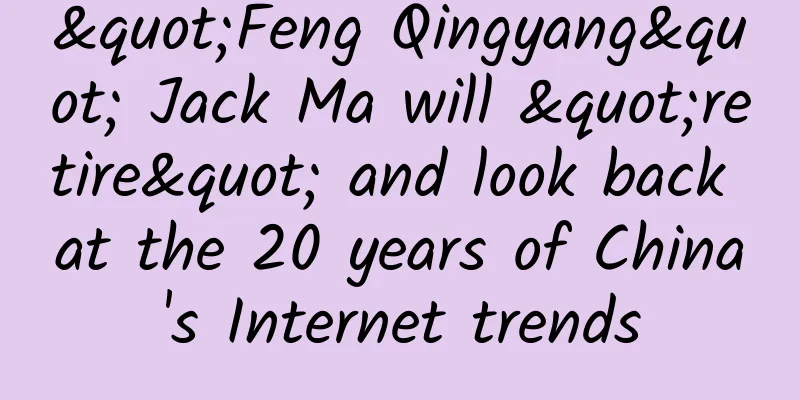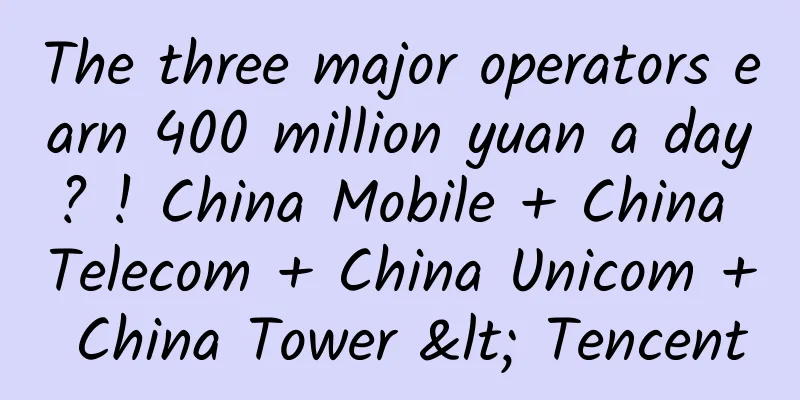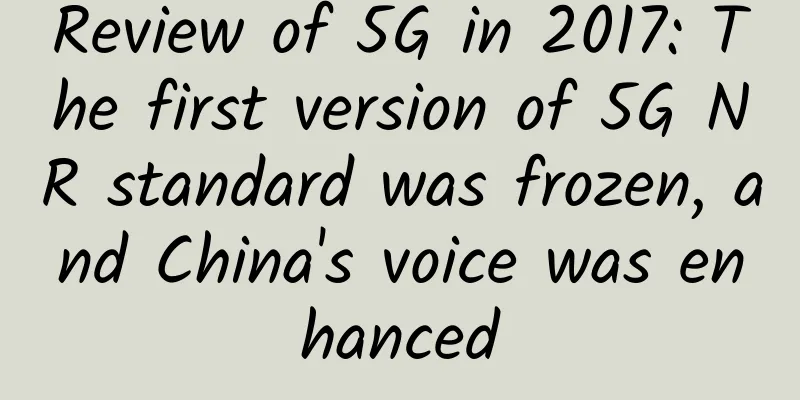"Feng Qingyang" Jack Ma will "retire" and look back at the 20 years of China's Internet trends

|
The wind disappears, but the tide moves. September 10th this year was quite turbulent for the Chinese Internet world, after all, Jack Ma, nicknamed "Feng Qingyang", will "retire" from Alibaba. As a benchmark figure in the history of China's Internet, Jack Ma is a symbol of the times. Although Jack Ma said, "I will no longer be the chairman of Alibaba, but it does not mean I will not start a business, nor will it mean I will retire," his resignation is still a historical node for the first generation of Chinese Internet entrepreneurs. On the other hand, in recent years, a new generation of entrepreneurs represented by Wang Xing and Huang Zheng have also emerged. Therefore, Jack Ma's "handing over the baton" not only marks the healthy inheritance of Alibaba, but also reveals the metabolism of China's Internet. Looking back at Alibaba’s 20-year development history, it itself represents the evolution history of China’s Internet - from a barren land to today’s lush and green, whether it is the transformation from PC to mobile Internet, or from consumer Internet to industrial Internet.
Looking at the present moment, after Feng Qingyang’s “retirement”, where will the vast ocean of China’s Internet flow to? The Wind Rises in Qiantang Hangzhou, the fifth day of the Lunar New Year. "Let's make business easy for everyone", Ma Yun was full of energy, and in a 150-square-meter house in Lakeside Garden, he said to the other 17 "Arhats", which later became known to the entire Chinese Internet world. It was 1999, when Ma Yun had just "come back from Beijing", "with nothing in his hands and wounds all over his body". At the same time, Wang Juntao, known as the "first person in China's e-commerce", had founded 8848; Li Guoqing and Yu Yu also co-founded Dangdang.com; Zhang Chaoyang went to Shenzhen to give a speech and was hailed as a rock star, like a "godfather". Among the more than 700 listeners, 28-year-old Ma Huateng was very excited. Just the year before, he and four other partners founded Tencent; while Liu Qiangdong was still selling 3C in Beijing Zhongguancun. The monthly turnover of the one-year-old "Jingdong Multimedia" has increased from tens of thousands of yuan to nearly 1 million yuan. The following year (2000), Ma Yun received $25 million of venture capital from Masayoshi Son, and formed a lifelong relationship with the latter. Just three months before that, Ma Yun also raised $5 million from Goldman Sachs. In the following four years, Alibaba had no record of financing. Four years passed in a flash. Tencent, Alibaba's future great enemy, was listed in Hong Kong that year. Taobao was born the year before (2003). With SARS rampant, Liu Qiangdong began to test the waters online. In the following years, the Internet wars continued and the competition was thrilling. In the end, Taobao defeated eBay, Google lost to Baidu, MSN was defeated by QQ, and BAT each gained something and became big players in the fields of e-commerce, search, and social networking, and the initial pattern was established. The highlight was 2007. In November, Alibaba B2B was listed on the Hong Kong Stock Exchange, and its share price soared to three times the issue price, becoming the "Hong Kong Stock New King" of the year, and Taobao was far ahead in the e-commerce C2C field. In the same year, a group of online game companies such as Giant Interactive, NetDragon, and Perfect World also quickly "reached the top". The financial crisis came unexpectedly, and the survivors were the winners. Alibaba began to plan to enter the "cloud" end; while Liu Qiangdong's financing was repeatedly blocked and he turned gray in a few months. By the end of that year, the number of Internet users in China reached 290 million, surpassing the United States and ranking first in the world. While the crisis was still spreading, the mobile Internet was quietly taking off. Since then, the PC side has gradually been replaced by the mobile side. Based on location and smartphones, people can access almost everything with the flick of a thumb. WeChat was launched in 2011, and the following year, its user base exceeded 200 million. Also in 2012, Cheng Wei left Alibaba and founded Didi (now Didi Chuxing); technical man Zhang Yiming founded Toutiao; and the two-year-old Meituan survived the "Thousands of Group Wars". As small giants "budded", the market capitalizations of Baidu and Alibaba were underestimated due to the lack of killer applications for mobile Internet. On the other hand, the Hong Kong Stock Exchange did not accept the partnership system proposed by Alibaba, so the latter was delisted from the Hong Kong stock market, with its market capitalization fixed at US$7 billion. The following year (2013), Jack Ma stepped down as CEO of Alibaba. "Most of the leaders born in the 1960s will withdraw from management and execution roles, and we will hand over leadership responsibilities to colleagues born in the 1970s and 1980s." Jack Ma, then 48, said in an internal letter, "I am no longer 'young'" and will be mainly responsible for the strategic decisions of the Alibaba board of directors. Just a few months before Jack Ma resigned as CEO, he said in another open letter that Alibaba would go all in on wireless, thus opening the curtain for the mobile transformation. The success of Taobao Mobile made Jiang Fan, a post-80s generation, well-known to the public. Only two years after delisting, Alibaba was listed in the United States in 2014, becoming the largest IPO in the history of the New York Stock Exchange at that time. For many Wall Street tycoons who valued time like gold, they had to spend 40 minutes waiting for the elevator just to meet Jack Ma. JD.com was also listed in the same year, with a market value of US$34.1 billion at the end of the year, becoming the fourth largest Internet company in China by market value at that time. The term BATJ came from this. Mergers and acquisitions were the key words of 2015. In the O2O sector, Meituan and Dianping merged, while in the travel sector, Didi merged with Kuaidi. Meanwhile, another Hangzhou native, Huang Zheng, founded Pinhaohuo. The market capitalizations of Tencent and Alibaba are also getting closer. A new round of changes was quietly brewing and showed its edge in 2016. In that year, Jack Ma took up the banner of new retail at the Yunqi Conference. Subsequently, new concepts such as borderless retail and smart retail emerged one after another. At the same time, people outside the Fifth Ring Road also became the focus. For a time, the giants and newcomers fought fiercely and the atmosphere was very lively. It was not until September 10, 2018 that Jack Ma issued an open letter titled "Happy Teacher's Day", announcing that he would no longer serve as chairman of the board of directors of the group one year later, on the 20th anniversary of Alibaba, and would be succeeded by current group CEO Zhang Yong. Metabolism of Pattern Change A year has passed, and the tide has risen. Behind Jack Ma's "retirement", China's Internet landscape has changed again. The BAT saying has gradually faded, a new generation of entrepreneurs has emerged, and the competition between AT is increasing day by day. Judging from the market value alone, Meituan, JD.com, and Pinduoduo have surpassed Baidu, which has been repeatedly labeled as "lagging behind". Among unlisted companies, Ant Financial has a relatively impressive valuation, second only to AT. Just on September 5, Pinduoduo's market value hit a new historical high of 40.5 billion US dollars, breaking the 40 billion US dollar mark for the first time, and higher than Baidu by 4.231 billion US dollars; Meituan's market value returned to the issue price in nearly a year after its listing, and its latest market value is 418.6 billion Hong Kong dollars; JD.com's latest market value is 45.3 billion US dollars. Due to the clarification of negative events and performance growth, its market value has increased by 45% compared with the end of 2018; and in the Hurun Greater China Unicorn Index ranking in the first quarter of 2019, Ant Financial ranked first with a valuation of more than 140 billion US dollars, second only to the market value of Internet listed companies Alibaba (US$460 billion) and Tencent (US$412.3 billion); but on the other hand, since taking the throne of market value in 2011, Baidu has been continuously surpassed by other Internet companies. Its latest market value is currently 35.8 billion US dollars, falling out of the top five in the market value ranking of Chinese Internet companies. "After the pure Internet dividend period, at the current stage of combining traditional Internet with offline channels and old industrial chains, Baidu has not used technology in these more down-to-earth industries, while Tencent and Alibaba are more down-to-earth and have deeper integration with consumers." Wang Shu, managing partner of Zhenghe Huitong, told the reporter of "Daily Economic News". However, under the new pattern, it is not just a monotonous competition between the two "superpowers". Various small giants are also eyeing the situation and striving to become bigger. Internet analyst Yin Sheng said in an interview with the Daily Economic News: "For Alibaba, there are two models now: Pinduoduo and O2O (Meituan). Both models are challenges for Alibaba. Pinduoduo maximizes the high cost-performance ratio and returns the platform to functionalism; while Meituan has huge opportunities due to mobile Internet. After all, O2O is essentially a business with high user frequency and user penetration." There are always talented people in every generation. Behind the rise of new players is the emergence of a new generation of Internet entrepreneurs. Unlike the wildness when Jack Ma "conquered the world", the new generation of entrepreneurs grew up with the Internet. Therefore, for the latter, there is a more instinctive intuition, and the gameplay is also different. For example, Wang Xing's "nine losses and one win" and Huang Zheng's use of group buying to dig gold in the sinking market. Wang Shu believes that the society that the new generation of entrepreneurs have come into contact with during their rapid growth period is already an Internet society, and their understanding of the Internet is more profound than that of the older generation of entrepreneurs; secondly, overall, the new generation of entrepreneurs are also better than the older generation in terms of academic ability, knowledge background, personal qualities, etc., and the quality of their team composition is becoming more elite; thirdly, most of today's new entrepreneurs are around 40 years old, and are more aggressive than traditional BAT entrepreneurs, and dare to fight against giants. Compared with the older generation who do things silently, the new generation of entrepreneurs are also more aggressive in building their personal brands. Yin Sheng believes that when the first generation of entrepreneurs represented by Jack Ma emerged, the market was not formed at all, and they still needed to educate the market and cultivate confidence in the entire ecosystem. Therefore, they needed the ability to create momentum. When the second generation of entrepreneurs entered the market, many infrastructures had been improved, and even user education had been completed. Therefore, some product positioning capabilities were needed at this time. The predecessors planted trees, and the successors enjoyed the shade. However, the trees planted by the predecessors also determined the space where the successors could "enjoy the shade". In other words, on the one hand, the new forces enjoy the convenience of the infrastructure established by the first generation of entrepreneurs after overcoming difficulties, but on the other hand, they also need to be restricted by the latter. This restriction is often most obvious in business competition and life-and-death struggles. In addition, compared with the first generation of entrepreneurs, the Internet upstarts are also inferior in many matters. Some industry insiders said that whether it is Wang Xing or Zhang Yiming, from a background, they are both technical entrepreneurs. They are relatively young and may not have reached such a perfect level in terms of company macro management and strategic management. "Their companies have not reached such a big stage, and there is a gap compared to the older generation of entrepreneurs, but they are still young and still have a lot of room for growth." said the above industry insider. On the other hand, most of the new Internet companies in China have risen to prominence after 2008 with the mobile Internet boom, and have no experience of leapfrogging cycles. As Wang Shu told reporters, "The growth path of the new generation of giants is quite smooth. They have not encountered major policy changes, or the deterioration of the global economic environment that has forced them to make changes. They have not experienced a financial crisis, or the complete bursting of the Internet bubble. All these have posed challenges and tests to their strategic management capabilities. They will eventually face such an environment, it's just a matter of time." With the deconstruction of the BAT structure, the temporary situation of "two supers and many strongs" supported by AT has been established. In this regard, Yin Sheng said that the existence of many strongs is a stimulus that can stimulate the innovation of the two supers. This structure is helpful for the long-term development of the market and can stimulate innovation in China's Internet. After other companies segment their services, they can make concentrated investments in some markets, which will help China's economy and technology to develop in depth. 20 years of tide In the post-mobile Internet era, where will the entire Chinese Internet flow? What other possibilities are there besides A and T? There is a consensus in the industry that after the Internet has been integrated with clothing, food, housing and transportation in the past 20 years, it will be integrated with the more traditional B-side. Therefore, whether it is A, T, or other players, they have been active in this regard in recent years, and "industrial Internet" has become a hot word. "This market is much larger than the consumer market, but it is usually not perceived. In the process of integration, it will present many new directions and some new business opportunities." Wang Shu said that even for Alibaba and Tencent, it is difficult to integrate with the traditional manufacturing industry as they do not have inherent advantages. The application of breakthrough technologies such as the Internet of Things and artificial intelligence may also play a "magic role". Yin Sheng believes that the Internet of Things and artificial intelligence may become a disruptive "paradigm" after the mobile Internet. All companies, including the "multi-strong", have the opportunity to "rebound". After all, the pattern is temporary. "Some new companies will rise in this process if they seize the opportunity." Yin Sheng said that the key is whether they can seize the opportunity of major changes, which is more important than the market value. On this basis, we also pointed out with industry insiders that although the integration of the Internet and "old" industries will definitely drive industrial Internet, the combination of the two needs to reach a specific time point. Each industry has its natural growth cycle, and some industries have not yet reached the time of change. In the upgrading and transformation of traditional industries, new giants will definitely develop in new directions. This is an inevitable event. At the same time, a company cannot use its own technical capabilities to change all industries. Therefore, many small giants will be born in the future. "It doesn't have to be at the 100 billion level. It will definitely come out at more than 5 million (billion), especially the combination of artificial intelligence and traditional industries. There may even be big giants." The industry insider said. In other words, more new small giants will emerge in the new vertical track. "Comprehensive giants have become infrastructure, and companies in niche markets or specific technologies and fields will become small giants. Only in this way can the influence of the Internet develop in depth." Yin Sheng said that in the past, everyone wanted to be a super giant, which also caused competition in the Internet world. Everyone was scrambling to stake out a piece of land and wanted to become an omnipotent platform, which was actually a manifestation of a lack of security. For those companies that have become small giants, Wang Shu believes that they have opportunities to cultivate one or two fields, maintain "small but beautiful", or dig into fields that A and T have not yet laid out, but when they grow to a certain extent, they will definitely face a struggle with the entire industrial chain of A and T. "This is difficult, unless there are drastic changes in policies or the global economy, and if there is a stable market environment, it is difficult to break through the A and T pattern." He said. As China's Internet development becomes more mature, going overseas also provides a number of companies with different imagination space. Whether it is the success of TikTok overseas or Didi's exploration in Latin America, they cannot be ignored. As Yin Sheng said, "Most companies have not expanded beyond the Chinese market. I am more looking forward to the emergence of international companies, and when targeting a niche market, it is best to target a global niche market, so that the market is large enough and relatively stable. Although the Chinese market is quite large and has enough users, targeting a niche market, especially in the technology-oriented field, still needs to develop globally." After 20 years of ups and downs, perhaps the day when China's Internet regards the world as its "battlefield" is not far away. |
<<: Learn how to start your networking career
>>: Dynamic routing! Dynamic routing! The principle and configuration of dynamic routing
Recommend
CloudCone promotional annual payment of $9.99 VPS restock, Los Angeles MC data center
CloudCone has added more inventory to the Hashtag...
What’s so special about Wi-Fi 6?
What is Wi-Fi 6? Wi-Fi 6 is the alias given by th...
Say goodbye to manual editing: How to quickly create an Ansible hosts file with Python?
In the field of automated operation and maintenan...
8 trends in infrastructure development in 2018
Cloud computing is gradually gaining favor among ...
What security risks may cause the Internet speed to suddenly slow down?
[[434023]] This article is reprinted from the WeC...
The cybersecurity industry developed rapidly in 2021, and Xinglan Technology achieved outstanding results in the new track of API security
With the rise of emerging technologies such as cl...
In just 3 months, the cumulative financing exceeded 600 million yuan. Ruishu Information announced the completion of the C3 round of financing of 100 million yuan
After completing the C2 round of financing in Sep...
Software AG: 50 million euros invested in HELIX plan, doubling the number of employees in China in the next two years
[51CTO.com original article] Recently, the enterp...
Industry Observation | Impact of 5G on the Environment
Investigating the technical, environmental and so...
5G "new infrastructure", new scenarios, new models
Since the beginning of the year, the central gove...
Service assurance cases in carrier SDN
There is a lot of interest in carrier SDN and the...
How to determine whether the protocol is Websocket in Http Header
[[398343]] This article is reprinted from the WeC...
CNNIC releases the 49th "Statistical Report on Internet Development in China"
The China Internet Network Information Center (CN...
Practice on optimizing VUA forwarding performance of vivo unified access gateway
VLB stands for vivo load balance. As the IDC traf...









